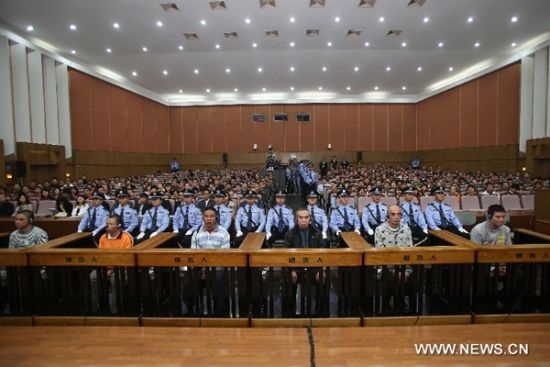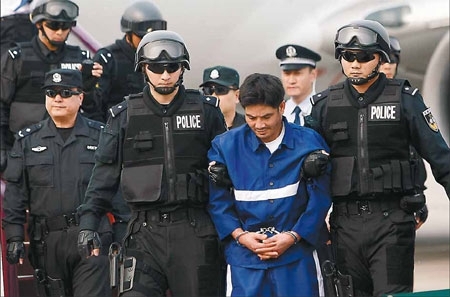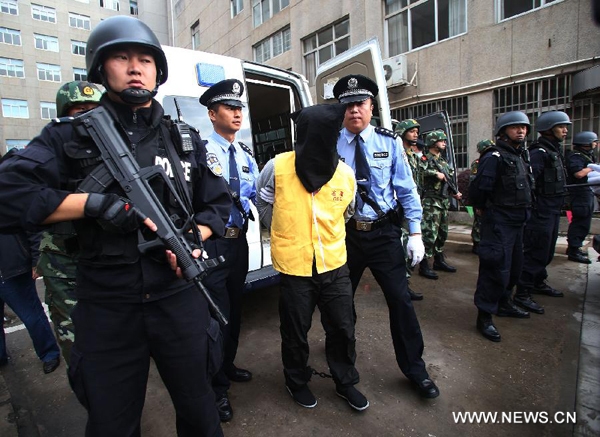The Mekong Pirates on Trial
September 24, 2012 Leave a comment
For 3 days at the end of last week, the Intermediate People’s Court in Kunming, the capital of the Yunnan Province in southwest China, was the stage for yet another high profile, yet swift, criminal trial. The case involved the mysterious murder of 13 Chinese sailors on the Golden Triangle’s area of the Mekong River in October last year. We have blogged about the incident here, focusing in particular on China’s unprecedented role in strengthening law enforcement in the strategic Mekong River basin. Since the murders, Laos, Vietnam, Myanmar and even Thailand joined China in holding several military patrols across the lawless boundary waters.
The murders, one the deadliest assault on Chinese nationals oversea, sparked a large public outcry in China. It therefore comes as little surprise that the trial attracted much attention from the Chinese press. Among the 6 defendants was Naw Kham (aka Nor Kham aka Jai Norkham),a member of Myanmar’s Shan ethnic minority and a notorious once-untouchable drug lord and gang leader who for years is thought to have ruthlessly run the drug and other illicit trade in the Golden Triangle area. Naw Kham was arrested in April in Laos in another joint military sting operation and traded over to China shortly thereafter. Prior to his arrest, only two blurred pictures of Naw Kham were said to exist.
Much of the news regarding the investigation and trial is limited to Chinese media, with only a few outlets providing reporting in the English language. The holding of the trial has been hailed as another example, further to the joint river patrols, of China’s growing concern over cross-border security issues and its novel policy of regional cooperation in combating international crimes. Indeed, it is unlikely that the arrest and trial of the alleged perpetrators could have taken place in such a swift manner without China’s involvement. As discussed in another previous post, most notably this policy included China’s unprecedented participation in the international anti-piracy patrols off the coast of Somalia and in the larger Gulf of Aden area. Chinese media praised the trial as a model of judicial cooperation, coupling armed drug trafficking gangs on the Mekong and Somali pirates as “common enemies of mankind” and calling for their prosecution as a duty of all States. This is a remarkable development in the debate over the universal nature of piracy prosecution but also, leaving piracy aside, in the more controversial debate over modern China’s sovereignty and its role in large-scale international cooperation. However, China’s sudden primary stance in the Mekong murders also seems to be a show of strength in view of other disputes concerning the economic development in the Mekong River basin as well as in other areas of economic interest in Asia.
After allegedly confessing his role in the Mekong River murders upon his arrest and recanting it in a recent interview, the media reports that Naw Kham partially admitted knowledge of the murders at the beginning of the short trial, which then concluded with his full admission of guilt and plea for leniency. All other defendants, members of Naw Kham’s gang, promptly confessed their responsibility upon the opening of the trial. They were all accused of murder, drug trafficking, kidnapping and hijacking and now face the possibility of the death penalty. During the trial, simultaneous interpretation was provided in Laotian and Thai to accommodate the testimony of foreign policemen and witnesses from Laos and Thailand. Such testimonies are apparently unprecedented in Chinese judicial proceedings. China asserted jurisdiction over the case upon its direct links with the crimes and the victims as well as within the general framework of regional cooperation within the Mekong River. Chinese media also praised the trial as a demonstration of the efficiency of Chinese judiciary to the rest of the world. From an international justice perspective, however, doubts still remain as to the procedural fairness and completeness of such fast-paced trials whose outcome increasingly relies on the defendant confession. Interestingly, the arrest and trial of Naw Kham seems to have fallen under Interpol’s radar, as at the time of writing Naw Kham still remains on its Most Wanted Fugitive List.
According to the prosecution, the Chinese boat refused to pay protection money for safe-passage in Naw Kham controlled areas and the murders were framed as a drug related incident to set an example. Several aspects of the murders, however, remain unclear. In particular, one possibly relevant factual element of the case appears to have been given limited consideration, namely the alleged participation in the murders of 9 members of the Thai military, part of an army unit responsible for security along the Mekong. Initial investigations by Chinese authorities already revealed a role played by a group of Thai military. It is still unclear whether they acted in collusion with Naw Kham’s gang. Investigation by Thai authorities, who are currently holding the soldiers as suspects, appear to show conclusive and corroborative evidence of the Thai soldiers shooting at the Chinese boats once they crossed over into Thailand.


